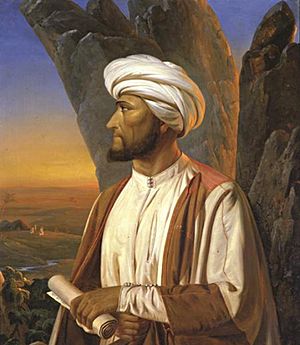Georg August Wallin facts for kids
Georg August Wallin (also known as Abd al-Wali) was a Finnish explorer and professor. He is famous for his journeys in the Middle East during the 1840s. Wallin was an "orientalist," meaning he studied the languages, cultures, and history of the Middle East.
Many people in Finland see Wallin as a very important figure in oriental studies. He is considered one of the most skilled Europeans to explore the Arabian Peninsula. Wallin was known for preparing carefully for his trips. He wanted to learn as much as possible about the places he visited.
Wallin was the first person to collect Bedouin poetry. He also made important notes about Bedouin dialects. His studies of spoken Arabic were very valuable for a long time.
Contents
About Georg August Wallin
Georg August Wallin was born in 1811 on the Åland Islands, which are in the Baltic Sea. His parents were Israel Wallin and Johanna Maria Ahrenberg.
Early Life and Education
Wallin went to school in Turku, Finland. After a big fire in Turku in 1827, his school moved to Rauma. He later left school to study on his own.
In 1829, he started studying Oriental Languages at the University of Helsinki. He earned his Master of Arts degree in 1836. After that, he began writing a paper about Arabic and Persian languages. He also worked as a librarian at the university.
In 1839, Wallin traveled to St. Petersburg, Russia. There, he met a scholar named Muhammad 'Ayyad al-Tantawi. This meeting helped Wallin learn even more about the Middle East.
His Journeys to the Middle East
Wallin made his first big trip to the Middle East in 1843. To get closer to the people he was studying, he pretended to be a Muslim. He used the name Abd al-Wali. There is no clear proof in his writings that he actually changed his religion. However, his grave in Helsinki has his Arabic name carved on it.
First Expedition (1843-1845)
On his first journey, Wallin traveled from Cairo to many important cities. These included Ma'an, Al Jauf, Jubba, Ha'il, Medinah, Mecca, and Jiddah. In 1845, he visited Mecca, a city that was usually forbidden to non-Muslims. This showed how dedicated he was to his research.
Second Expedition (1846-1848)
Between 1846 and 1848, Wallin went on his second expedition. During this trip, he visited Palestine and Persia (modern-day Iran). His writings from this time show that he was still thinking deeply about religion.
Return to Europe and Later Life
By 1850, Wallin had returned to Europe. The Royal Geographical Society in London published his notes from his journey through Northern Arabia. They also gave him a special award called the Founder's Medal. This award recognized his important research.
In 1851, Wallin finished his doctoral paper. He then became a Professor of Oriental Literature at the University of Helsinki. Both the Royal and Russian Geographical Societies asked him to go on another trip to the Middle East. However, he said no, possibly because his health was not good.
Wallin wrote that he found European culture difficult to get used to after his travels. He felt he "couldn't adapt [him]self to Europe any more." He died suddenly on October 23, 1852, just one day before his 41st birthday.
Wallin's travel writings were published after he died. A full collection of his writings was published in Swedish between 2010 and 2017. Translations into English and Arabic are also being planned.
See also
In Spanish: Georg August Wallin para niños
 | Jewel Prestage |
 | Ella Baker |
 | Fannie Lou Hamer |


